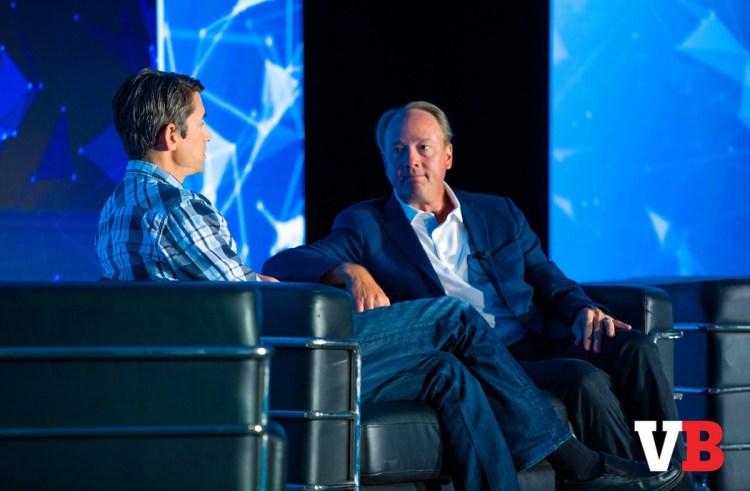Interviewing some of the wisest people in the game industry is a fun part of my job. Over the past few weeks, at the Electronic Entertainment Expo (E3) in Los Angeles and at the Gamelab event in Barcelona, Spain, I interviewed a bunch of executives, CEOs, and game creators about their views on gaming. This week’s column takes snippets of wisdom that I gleaned from those interviews.
I like to think of this as “strategic zoom,” or zooming in on important details or zooming out to see the big picture, just like you could do in Chris Taylor’s Supreme Commander game from a decade ago. After each E3, I try to absorb a few of the ideas and quotes that are really important.
We’ve all had a big data dump from talking to so many people at these big events. But I hope to zero in on some of the people who can synthesize what’s important. I’ve run longer Q&As with many of these people, but you probably didn’t have time to read these interviews during the show. Each name links to our full interviews. I hope some of these people will be speaking at our GamesBeat 2017 event on October 5-6 in San Francisco.
Also, here are quotes from the leaders we interviewed at E3 2015 and E3 2014.
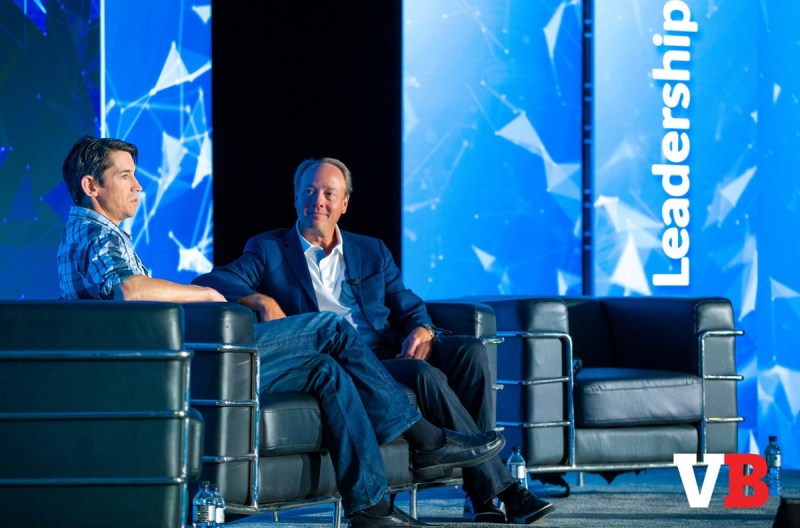
Above: Insomniac Games chief Ted Price (left) talks with Mike Gallagher, CEO of the Entertainment Software Association, at the GamesBeat Summit. 2017.
Mike Gallagher, CEO of the Entertainment Software Association, the trade group that puts on E3, responded to a question I had about how competitive the U.S. is when it comes to creating jobs in the game industry.
“I continue to hear and see great reasons for optimism when it comes to the ability of this country to continue to have a leading position in game-making. But it has to be earned every day. Policymakers cannot coast or expect that it will continue. They have to be very engaged to make sure that the environment remains favorable.
It’s not an easy task. Around the world — look what’s happening now, just within the United States. All 50 states now have game companies in them. That shows the democratization of game-making. Game creation is now something that can be done anywhere by anybody. That doesn’t just apply within the borders of the United States. It applies around the world, when you have tools like Unreal and Unity that can be accessed freely over the internet and put to work.
The United States does not have the market cornered on creative genius. What we do have is huge momentum drivers. We have respect for the rule of law. We have a thriving economy. We have a terrific secondary education system. We have protection for intellectual property. Most important, we have freedom of expressions. The government does not tell a game-maker what they can or cannot make. That’s a force multiplier that gives us an advantage even over western Europe.
I’m bullish about the prospects for the U.S., but very clear with policymakers. They need to continue to compete, because other countries are subsidizing the placement of jobs and seeking to displace the U.S. when it comes to making great games. When you look at mobile, it’s the wild west. There is great success being enjoyed by companies founded and operating outside the United States. That’s a signal. We have to continue to earn it every day.”
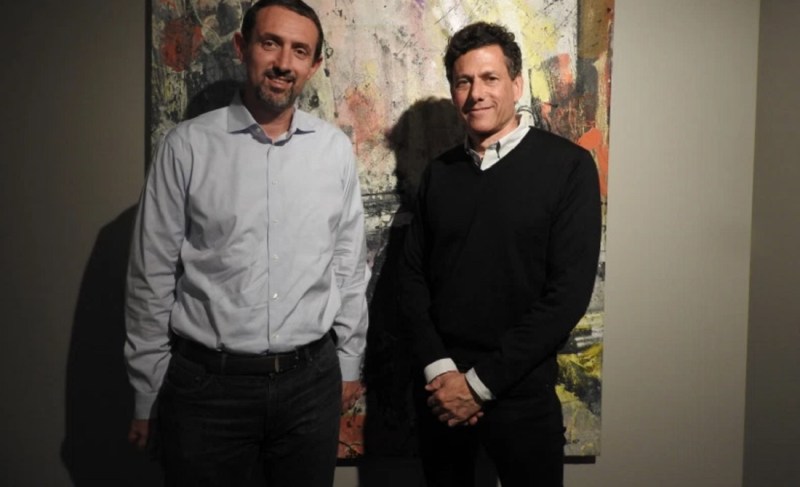
Above: David Ismailer (left), president of 2K, and Strauss Zelnick, CEO of Take-Two Interactive.
Strauss Zelnick, CEO of Take-Two Interactive, said it is hard to get Triple-A console developers to make mobile games.
“It’s very, very hard to have console developers create a mobile title, though. We tried it. We made Civilization for mobile – or for Facebook, actually – and it was fantastic, but it didn’t speak to what people do on Facebook. We made stand-alone mobile titles before we bought Socialpoint and they didn’t succeed. We have had success with WWE and NBA. We’re getting better at this. But Cat Daddy is the studio in our shop that does this. They’re not a console developer. They’re a mobile developer.”
Zelnick also lauded the move toward better stories in console games, like in Take-Two’s Mafia III.
“It’s that ephemeral sweet spot of character development, graphics, music, look and feel, and gameplay. You need all of it. We had great gameplay in Evolve, but we were sort of missing the story. We’ve had other situations where we had a great story, but the gameplay wasn’t adequate. When we get all of it right, like with GTA – great story elements, great character, graphics, look and feel, great gameplay – you see what happens.”
And he does not think that mobile games are poised to finance big console hits.
“We don’t really think that way. We’re not looking for financing. We’re looking to delight consumers. If we can’t do something well we don’t want to do it. We just don’t look at the world through that lens. We’re an entertainment company. We want to be the most creative, innovative, and efficient company in the business. We want to delight consumers in everything we do. We want to create the highest quality.
We got involved with Socialpoint because they make their own intellectual property, because they pride themselves on quality, and because there’s a market opportunity. We’re not doing science projects. There has to be a market opportunity. But we’re not looking for a cash cow to finance something else. It would be nice to have a cash cow, but it would come out of doing great work.
We have a strategy. Our strategy, again, is being the highest quality company, the most innovative company, the most efficient company in our space, and delighting consumers. That’s our strategy, and arguably the expression of our tactics as well.”
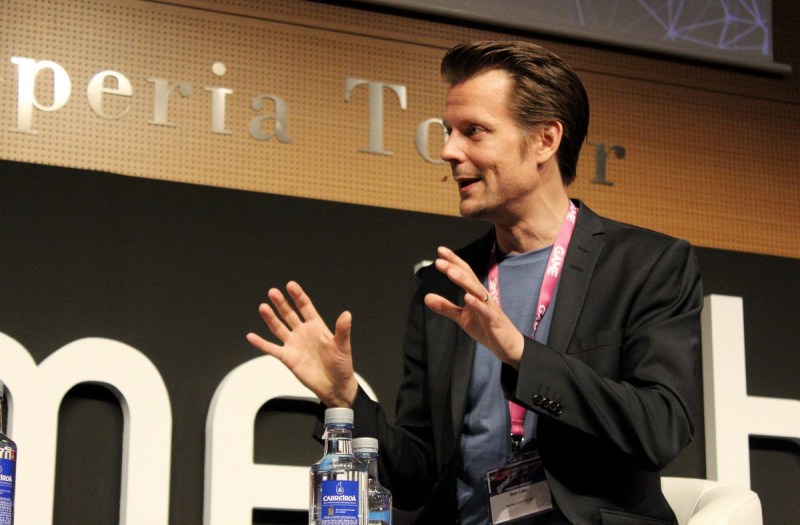
Above: Sam Lake is Remedy Entertainment’s storyteller.
I spoke with Sam Lake, creative director at Remedy Entertainment, at the Gamelab event in Barcelona, Spain. We talked about transmedia, or taking a single story and using it in different media such as TV and games.
“There are many signs of these different media coming together, and separating again, and then coming together again in different, surprising ways. That still interests me a lot. I want to explore those possibilities, keep exploring them. Both the traditional idea of transmedia — taking a game concept or character or story and seeing if you can do spin-offs or extensions outside games — but then also very much looking for new ways of bringing other media into the game experience. I think it’s essential as well as exciting. Like anything else, you can do it in an interesting way, or in a way that really doesn’t bring anything very new to it. Even that can work out nicely if you have talented people catching it and making their own interesting spin out of it. But either way we’ll keep exploring it in the future.”
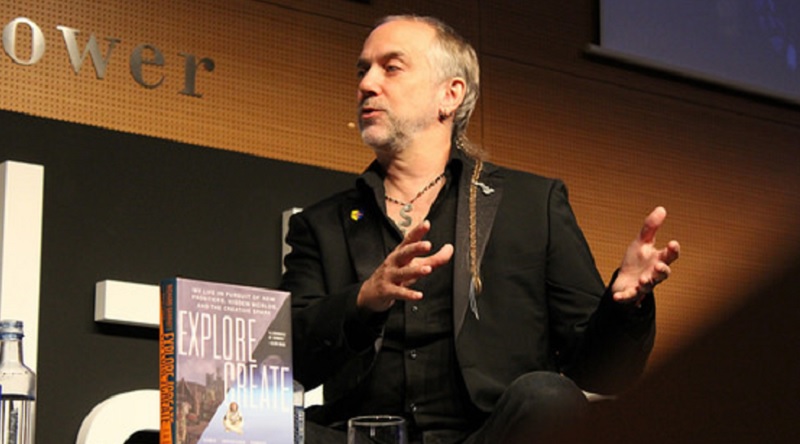
Above: Richard Garriott speaks at Gamelab in Barcelona about his 40 years in games.
Richard Garriott, also known as Lord British, created the Ultima series of fantasy role-playing games, and he made the Ultima Online and Tabula Rasa massively multiplayer online role-playing games. Now he is back to being an indie again with Shroud of the Avatar at Portalarium. Here’s what he had to say about making new intellectual properties.
“Part of that is my belief that the introduction moment of a new platform is the moment where you can create new IP. Ultima, Wizardry, Might of Magic, all of these things were created, essentially, at the beginning of all platforms.
But once a platform matures, you have the reverse problem. Once you already have Ultima, Wizardry, Might and Magic, and Bard’s Tale, an RPG no one has heard of is hard to market. That’s when people start to buy licenses, like Lord of the Rings or Star Wars, to break through the chaff. But those people who do that don’t own the IP themselves. It’s only a way to get their game to sell well. As game creators, the real opportunity—you want to create IP, you want to own the IP, and the place and time to do it is when you have the blue ocean of a new platform, where existing powerful IP is not already present. These windows open and close periodically around us and you have to take advantage of those moments.”

Above: Cliff Bleszinski, CEO of Boss Key Productions and creator of LawBreakers.
Cliff Bleszinski, CEO of Boss Key Productions, maker of first-person shooter Lawbreakers, spoke about how it good to “un-retire” and get back in the game.
“I’m just proud. I got a little emotional this week. For me to un-retire because I was getting bored, to have a seat the table here, and to know that with my scrappy team of 65 folks I can compete with the heavyweights — it’s a pretty amazing feeling. Being at the Marriott and catching up with everybody, everybody was coming up and shaking my hand and saying, ‘Congratulations.’ I’m like, ‘Okay, I guess we’re doing all right?’ They weren’t putting their hands on my shoulder and saying, ‘My condolences.’ It feels good to be back on my own terms. I’m gonna sleep well after this show.”
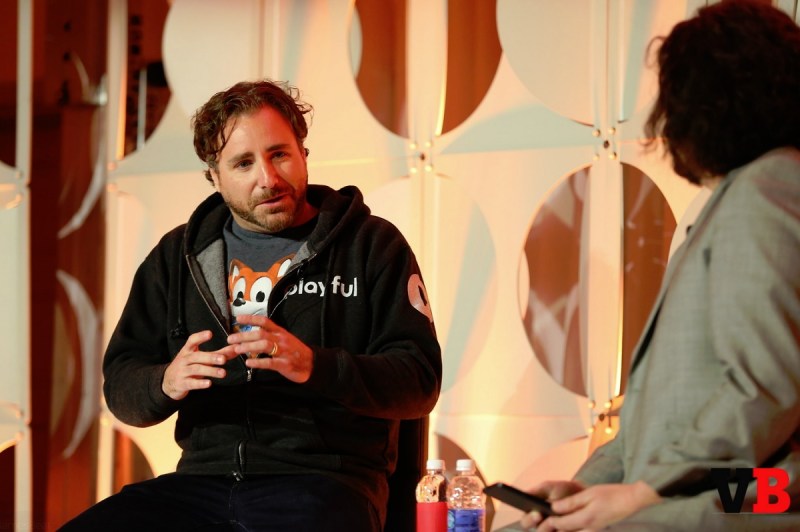
Above: Paul Bettner of Playful and Jeff Grubb of GamesBeat.
Paul Bettner, CEO of Playful, maker of Lucky’s Tale for virtual reality and Super Lucky’s Tale for the Xbox One, talked about the strategy of creating a new intellectual property in virtual reality and then taking that property, based on the character Lucky, to 2D flatscreen games.
“I’ve been thinking about it a lot at this show because it sounds similar, but it’s a different idea. We are targeting two groups of gamers with what we’re working on with Super Lucky’s Tale. We’re targeting 30- to 40-year-old gamers who grew up playing platform games and who love this genre. They see it and think, ‘That’s like a game I remember from when I was a kid.’ Those are the folks that are going to talk about the game. They’re the reviewers that’ll give us a lot of press. But we’re also targeting the 8-year-olds who are playing their first game.
In the way that we’re using VR as our tip of the spear to get attention for the IP, we’re also using the enthusiasm and the nostalgia for these kinds of games to get that attention and ultimately using that in service of introducing the game to a new generation of gamers. I was having this conversation with our creative director last night. I think that’s actually what Nintendo does and has been doing for decades. It’s this endless cycle because then, those folks grow up and have kids. It’s a great strategy, I think, for the stuff we’re building.”
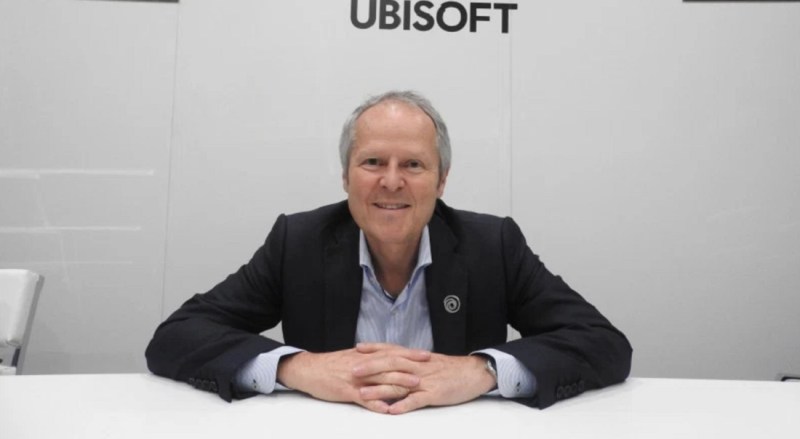
Above: Yves Guillemot celebrates a good E3 and and a good three decades
Yves Guillemot, CEO of Ubisoft, talked about the rise of interactivity.
“It’s difficult to say what eventually becomes the biggest part of the industry. We like very much that the consoles are so successful now. They’re coming back as a major entertainment medium. Interactivity is going to become the major force in entertainment as a whole.”
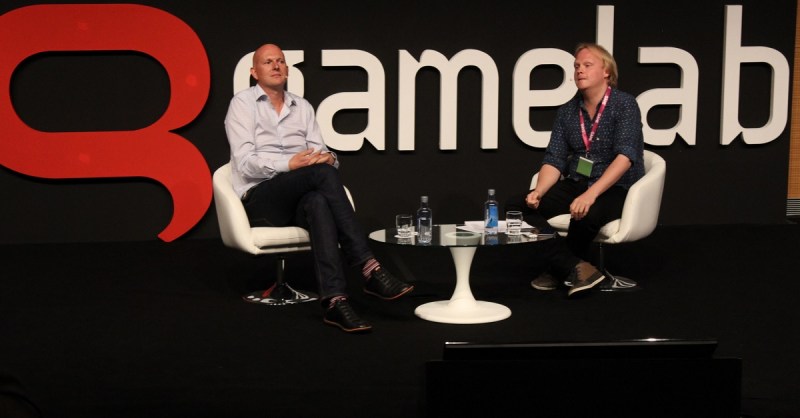
Above: Phil Harrison (left) of Alloy Platform Industries and Matt Handrahan of GamesIndustry.biz
Phil Harrison, former Sony and Microsoft game executive and current cofounder of investment firm Alloy Platform Industries, talked to me about the big platform companies — Sony, Microsoft, and Nintendo, as well as Google, Apple, and Amazon — and whether their big game businesses are intentional or unintentional (neglected in some way).
“They all have tremendous positives and some small challenges. If Microsoft’s Xbox business was a stand-alone business, only focused on games, that would be an incredible business. When you look at it as a part of Microsoft spitting out $20 billion in free cash flow every year, it just shows up as a tiny little dot, which is always a deep frustration for the leadership in the Xbox business. They do an incredible job, but they don’t show up that often on the scorecard.
It’s a different pressure that Sony has. They have a much smaller balance sheet. They’re a much more focused company through necessity, through the challenges they’ve been through, which have been public over the last 10 years or so. It’s a good question. Which would you rather be: a focused company with a smaller balance sheet or an unfocused company with a very large balance sheet? Ultimately a strong balance sheet is a good thing to have, which is why a company like Amazon could end up being a disruptive force in games. They have AWS as this secret provider of incredible services to so many games companies, which they’re monetizing like crazy.
I think Amazon knows they have a games business. It’s interesting that the games bit of Amazon reports in to the AWS leadership. That’s not a surprise or an accident. That’s very purposeful.
The one unknown, unseen is what Apple is really doing in AR and VR. I don’t believe for an instant that what they showed at the worldwide developer conference is all they’re doing in AR. But they made a very strong statement of intent, and that’s exciting for the future.”
Harrison said that mobile is the key market for game entrepreneurs to target.
“Even with all of the challenges of audience acquisition and barriers to entry — the development barrier to entry is really low, but distribution, awareness, cutting through the noise is really hard. Even with all those challenges, I still think mobile is the place to go. To make a console game as an indie, unless you have a sugar daddy relationship with the platform holder effectively sponsoring you, it’s really hard to make money….
You’re betting on five watts versus 160 watts. Are you going console, PC, hardcore, or are you going mobile, free-to-play? It doesn’t seem like there have been breakout hits in free-to-play on console yet, maybe because the top of the funnel isn’t big enough to support all of the customer acquisition. But that will happen.
I’m excited about the future. I’m enormously bullish about the future of games, mainly because now we don’t have to explain what this is anymore. There’s an understanding of games among the wider population.”
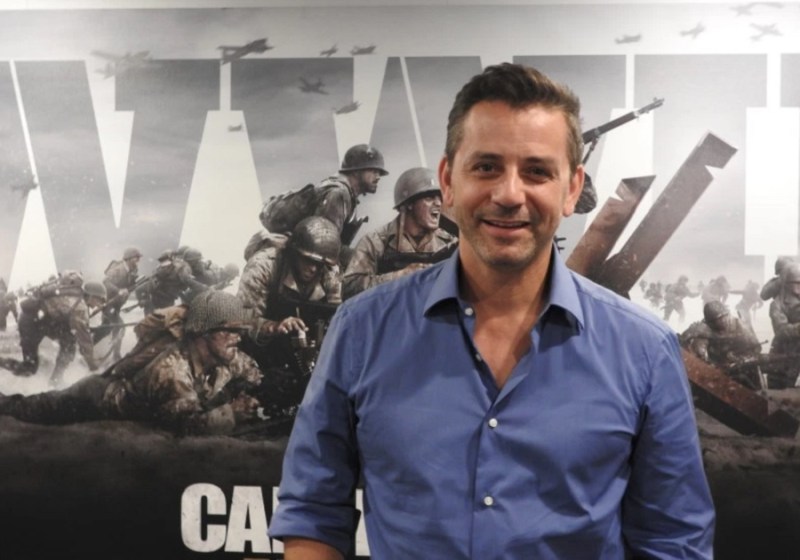
Above: Eric Hirshberg is CEO of Activision Publishing.
Eric Hirshberg, CEO of Activision Publishing, talked to me about why the time is right for another Call of Duty game set in World War II.
“Sledgehammer has that cinematic storytelling gene, that impact in their creative approach that is really well-suited to the anguish and the humanity of the WWII setting. To their credit, they talked to the team, got excited about it, and got on board. We’re all over the opportunity. It’s been off to the races from there.
Everyone talks about ‘boots on the ground.’ I think of it a little differently, in terms of a human scale. There’s a vulnerability to the way you feel when it’s just a man and a gun. That’s what taking Call of Duty back to its roots means to me, that sense of vulnerability. And I think it’s a great game.
Certainly the level of graphic fidelity, the level of emotional connection you have with a human character in a game, the level of immersive, photorealistic environments — all of that has gotten exponentially better since the last time we were in the WWII setting. As a result, I think the impact and the feeling is incredible. It’s a game that not only plays great, but it feels great.”
Disclosure: The organizers of Gamelab paid my way to Barcelona. Our coverage remains objective.
